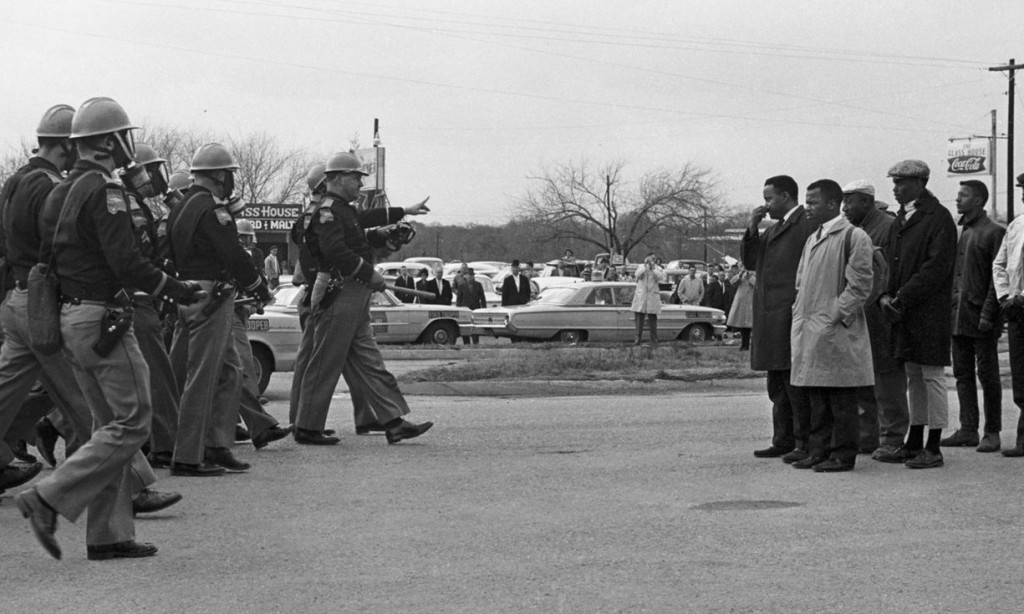I Am Not Your Negro
– James Baldwin’s
words weave film of
immense power
Raoul Peck’s documentary I Am Not Your Negro has a “written by James Baldwin” credit in its opening sequence. At first this seems like a polite tip of the hat to the author, essayist and public intellectual who died nearly 30 years ago. Soon we realize this is an accurate statement of fact. Each line of the narration that permeates the film is taken directly from one of Baldwin’s texts or letters. His words dominate the archival clips as well.
It in no way diminishes Peck’s work as a film-maker to suggest that Baldwin’s ideas and personality are the author of this movie. It is a striking work of storytelling. By assembling the scattered images and historical clips suggested by Baldwin’s writing, I Am Not Your Negro is a cinematic séance, and one of the best movies about the civil rights era ever made.
Eschewing talking head interviews, Peck’s documentary ends up as Baldwin’s presumptive autobiography, but it gets there via an unexpected route. During the final years of his life, Baldwin was researching a book he planned to call Remember This House. It would profile three assassinated civil rights leaders: Medgar Evers, Malcolm X and Martin Luther King. He intended it to be a personal work, as he knew each of these men, and telling their stories would likely be a springboard to tell his own story at a more advanced age.
Beginning with Baldwin’s pitch to his agent, we link to touch points with the slain men, hopping through time, juxtaposing Baldwin’s personal essays with his public statements. (As with last year’s wonderful Best of Enemies, I Am Not Your Negro excerpts from the Dick Cavett show. I can only imagine a documentary about him is headed our way soon.) The entirety of Baldwin’s written and on-camera oeuvre eventually mixes down to a roux, and while Peck uses the occasional chapter break, the effect is more of a Chris Marker-like cine-essay than typical Frontline-like reporter’s documentary. (Though they both focus on the topic of race in America, I Am Not Your Negro is quite the opposite of ESPN’s justly celebrated OJ: Made In America.)
Peck occasionally takes advantage of some of Baldwin’s more prophetic passages to flash-forward through time. Images from Ferguson, the Obama inauguration and the dross of daytime TV aren’t there so much to say “see, he was right?” as to make us realize the timelessness of his greater arguments. Baldwin did much of his best writing about America while living as an expatriate, and this outsider’s perspective (shared by Peck, who is from Haiti) brings with it a tremendous amount of clarity. I Am Not Your Negro’s specifics are only intermittent, like reporting on different reactions between white and black audiences during Sidney Poitier films. By and large this film concerns itself with the greater philosophy of why groups in power behave the way they do. This might be the only movie about race relations I’ve ever seen that adequately explains – with sympathy – the root causes of a complacent white American mindset. And it took a black writer and director to do it.
The narration is done by Samuel L Jackson, and it’s one of the best things he’s done in years. No offense to the many boldfaced names who swoop into a recording booth to lend their voice and celebrity to a well meaning issue-oriented documentary, but what Jackson does here is give a performance. He doesn’t exactly mimic Baldwin, who we see in many of the archival clips, but he does much more than read words on the page. (I didn’t even realize it was him until the closing credits.) We live at a time when almost every notable person from the 20th century has a documentary about them streaming somewhere. That’s all well and good if they are about someone whose work you fancy. I Am Not Your Negro isn’t a special interest title, it is a film.
>via: https://www.theguardian.com/film/2016/oct/20/i-am-not-your-negro-review-james-baldwin-raoul-peck


